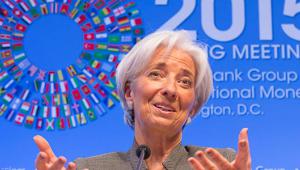Global economic growth last year reached 3.4%, hitting the rough average for the last three decades, she said ahead of the IMF’s spring meeting. But rather she noted that the lingering burden of the ‘great recession’ was faced by people, particularly youth unemployment and therefore the ‘growth was not good enough’.
‘Six months ago, I warned about the risk of a “new mediocre” – low growth for a long time. Today, we must prevent that new mediocre from becoming the “new reality”,’ Lagarde said, speaking at the Atlantic Council.
‘We can do better. We must do better... The bottom line is that risks to global financial stability are rising. The “new mediocre” growth environment is not a comfortable place with respect to financial stability.’
Quoting John F. Kennedy’s ‘the long-range risks of comfortable inaction’ and Winston Churchill’s ‘I never worry about action, only inaction’, Lagarde said not enough had been done to deal with the challenges of the financial crisis.
Advanced economies like the US and UK were doing slightly better than last year, while prospects for the eurozone was improving thanks to the European Central Bank’s monetary easing, she said.
Forecasts for most emerging and developing economies are slightly worse than last year, due to lower oil prices. She said Russia was experiencing economic difficulties, while Brazil was stagnating and the Middle East was beleaguered by political and economic trouble. China was slowing but growing more sustainably. Only India and Sub-Saharan Africa were performing strongly, she added.
‘Here is the big issue: while current growth is moderate, so too are medium-term prospects,’ Lagarde said.
‘In both advanced and emerging economies, potential growth is being pared down. This largely reflects lasting scars from the financial crisis, but also the undercurrents of changing demographics and lower productivity.
‘To prevent the “new mediocre” from becoming the “new reality”, structural reforms need to go hand-in-hand with macroeconomic and financial policies to raise confidence and generate investment. Frankly, in too many countries, these reforms have been lagging.’
She said reforms including infrastructure investment and removing the barrier to labour force participation were key to boosting growth and tackling inequality.
The IMF’s next World Economic Outlook will be issued next week.







